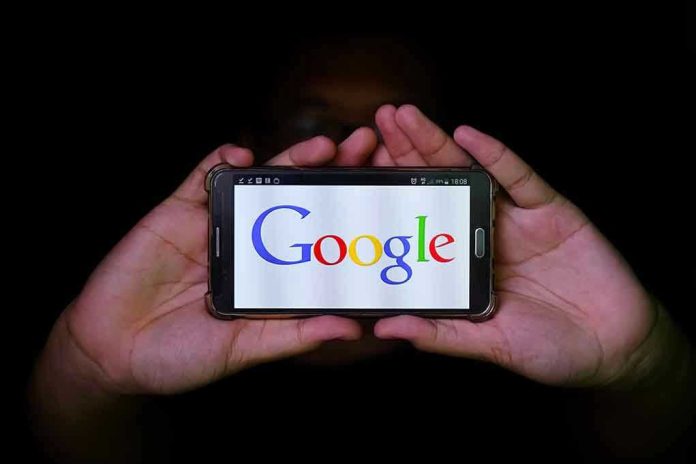
Google’s secret data harvesting exposed by a $425 million jury verdict proves Big Tech’s disregard for user privacy—and raises urgent questions about unchecked corporate power in America.
Story Highlights
- A federal jury found Google liable for violating the privacy of 98 million users by secretly collecting data—even after users disabled tracking.
- Google must pay $425 million in damages but faces no punitive penalty after the jury found no malice.
- This case adds to a growing pattern of Big Tech privacy scandals and legal scrutiny, exposing gaps between corporate promises and user rights.
- Conservatives see the verdict as a wake-up call for stronger constitutional protections against tech overreach and government-enabled surveillance.
Federal Jury Exposes Google’s Privacy Violations
A federal jury in San Francisco has ordered Google to pay $425 million for violating the privacy of nearly 100 million Americans. The class-action lawsuit revealed that Google continued to collect and store user data from mobile apps even after users had specifically disabled the “Web & App Activity” tracking feature. This verdict, delivered on September 3, 2025, is one of the largest privacy penalties ever levied against a Silicon Valley giant. The jury did not find malice, sparing Google from punitive damages, but the magnitude of this case is a shot across the bow for all who value privacy, personal rights, and transparency from powerful corporations.
Google must pay $425 million in class action lawsuit over invading users’ privacy, jury rules https://t.co/1FmcSx1qyx pic.twitter.com/gnlLyFNhW4
— New York Post (@nypost) September 4, 2025
Google’s legal defense claimed that the data collected was nonpersonal and stored securely, but the jury found this argument insufficient. Plaintiffs’ attorneys described Google’s privacy assurances as “blatant lies,” pointing to a pattern of deception and disregard for user choice. The lawsuit, filed in July 2020, covered data collection going back to 2012 and involved a staggering 174 million devices. The court certified the case as a class action, acknowledging the broad and systemic impact on Americans’ digital rights. The verdict follows other recent privacy scandals, including Google’s agreement in April 2024 to erase billions of records from its Incognito mode data collection, and a $1.4 billion settlement over state privacy law violations in Texas.
Big Tech, Big Government, and the Erosion of Individual Liberty
Google’s business model—like much of Big Tech—relies on relentless data collection, often operating in the shadows of vague consent screens and buried privacy policies. This verdict exposes just how little control Americans actually have over their personal information, even when they believe they have opted out. For years, tech companies have assured users that privacy settings protect them, but this case demonstrates the dangerous gap between corporate promises and reality. Conservatives have long warned that unchecked corporate power, especially when abetted by government complacency, threatens the constitutional values of privacy, autonomy, and limited government. The pattern is clear: whether it’s Silicon Valley’s censorship, government surveillance, or now mass data collection, American liberties are under constant siege.
While Google insists it will appeal, claiming the verdict “misunderstands how our products work,” privacy advocates are celebrating this as a rare victory for consumer rights. However, the fight is far from over. The legal landscape remains tilted in favor of tech giants, who leverage armies of lawyers and massive financial resources to defend questionable practices. The fact that Google avoided punitive damages despite such a large-scale violation underscores the uphill battle ordinary Americans face in holding Big Tech accountable. Now, with a new administration in the White House promising to rein in both government overreach and corporate abuse, conservatives are demanding robust enforcement of constitutional protections—not just empty promises or symbolic settlements.
Implications for User Rights and the Tech Industry
The implications of this verdict are sweeping. In the short term, Google faces a record-breaking financial penalty and mounting public scrutiny over its data practices. For the nearly 100 million Americans affected, the case shines a light on the hidden costs of digital convenience and the urgent need for real, enforceable privacy protections. In the longer term, this ruling could set a precedent for more aggressive litigation and regulatory reforms—forcing tech companies to actually respect user consent and constitutional rights. Other tech firms, wary of similar lawsuits, may finally be compelled to shift toward greater transparency and user control.
This verdict also raises political stakes. With the 2024 election having brought in a new administration focused on restoring constitutional order, there is renewed momentum to push back against both government and corporate abuses of power. Conservatives see this as an opportunity to demand not just accountability from Big Tech, but also reforms that safeguard the First and Fourth Amendments—ensuring that neither bureaucrats nor billionaire CEOs can erode the fundamental freedoms that define America.
Expert Analysis and the Path Forward
Industry experts and privacy scholars agree that this case marks a turning point in the battle over digital rights. The jury’s decision signals a growing intolerance for secretive data practices and a shift toward stronger user protections. Legal analysts predict a wave of new class actions and regulatory interventions, emboldened by the precedent set here. Still, some caution that Big Tech will fight back, warning of potential impacts on innovation and service quality. Ultimately, the verdict highlights the urgent need for vigilant citizens, principled lawmakers, and a legal system willing to defend the rights enshrined in the Constitution. For conservatives, the message is clear: the fight for liberty in the digital age is only just beginning.
Sources:
Data snooping: Google hit with $425m verdict, accused of tracking users; case covers 98m people
Jury tells Google to pay $425 mn over app privacy




